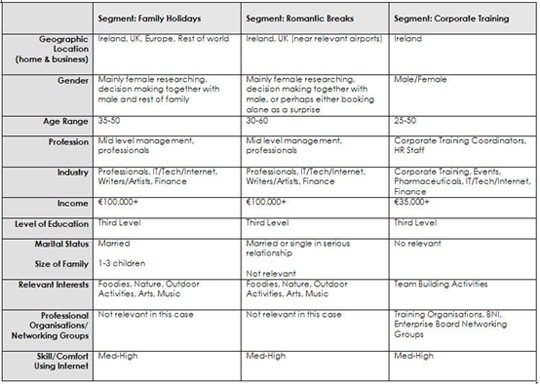When you are first starting out in business you may put all of your efforts into whatever marketing you can afford or have time to do: taking classified ads in local papers, setting up a diy website, signing up on all the social networking sites, sending direct mail letters by post, going to networking meetings, etc.
Even though you are targeting as many people/businesses as possible, you may find that these efforts are not bringing in a steady stream of prospects, or are bringing in the wrong kind of prospects for your business. Your activities are unfocused because you’ve skipped the most important first step to getting good results with your marketing efforts: identifying your target market.
Taking the time to identify your target market, including breaking it down into appropriate segments, and then utilizing this information in your online marketing activities will save you a significant amount of time and money — and will bring much better results for your business. This is just the first step of a full marketing plan, but it is the most important and doing this alone will put you on the right track whether you are using SEO, Social Media, Pay Per Click, Email Marketing or any combination of these.
1. Commit a half day of your time to properly identify your target market and get your marketing efforts back on track:
- Look at your existing customers. Which customers are the most profitable, take the least of your time, are easiest to deal with, give good referrals, etc.?
- Look at your range of products/services. Who are your products/services really relevant to? (Don’t just say ‘everyone’ thinking that you’ll bring in loads more business. We must be completely focused here.)
- If you are targeting businesses (B2B) rather than individuals (B2C), look at the decision makers in each business, as well as those that may just do the initial research into purchases.
Tip: If you are involved in a non-profit organisation (charities, educational institutions, government bodies, etc.) this applies to you too! We are all trying to sell something to somebody; whether it is a sweater, life insurance policy, consultancy services, streaming videos to watch or an idea of a better way of life.
2. Note the following details about these targets:
- Geographic Location (home & business)
- Gender
- Age Range
- Profession/Industry
- Income
- Level of Education
- Marital Status/Size of Family
- Personal Interests
- Professional Organisations/Networking Groups
- Skill Comfort Using Internet
3. Create segments for the targets where your products/services are relevant to more than one category in the lists above. For example, a top-end, luxury, self catering resort I work with came up with a number of segments of targets that would be interested in various types of accommodation, breaks and activities offered, each with a different target audience: Romantic Weekend Breaks, Family Holidays, Corporate Training, etc.:

Download full example at: http://www.e-business.ie/sample-target-market.pdf
4. For each segment, identify:
- which types of websites (and specific websites possible to identify) they visit;
- what social networking channels they use;
- how frequently they use the internet and their social networking channels;
- which days, and times of day, they use the internet;
- how they use the internet/social media;
- who they connect with on their social media channels and who the main influencers are;
- if email marketing would be an effective technique to reach this audience;
- seasonal factors – what times of the year would the specific products/services best suit and how far in advance would a customer research/book/purchase/enquire?
5. Define how each of these factors applies to your online marketing activities:
Search Engine Optimization
Take the following into account when selecting which keyphrases to target and what content to include on your website and what language to use to attract the right visitors to your website.
- What search engines do they use?
- What search phrases do they use?
- How do they search? Will they browse a number of sites and read information thoroughly to make a decision, or quickly pick from the site that comes up highest in searches. Will they be more interested in directory sites, or a good site for a specific business? (Good article on SEOBOOK: “Getting inside the mind of the searcher”)
- Website Content: What topics, relevant to your offerings, are of interest to your targets?
Tip: This exercise will help you to determine which very specific, relevant “long tail” search phrases to target in order to most effectively attract visitors that will convert to customers.
Social Media Marketing
Take the following into account when determining which social media channels to use, as well as when, how and what to post and who to connect with:
- What social media channels do they use?
- When are they online in these channels?
- How active are they on social networks? Would they follow/friend/connect with a large number of other businesses?
- Who are your targets’ influencers on these channels?
- What topics, relevant to your offerings, are of interest to your targets?
- Would they be interested in competitions/games/polls?
- Would they be interested in special offers, tutorials, ‘inside information’?
- Would video, podcasts, images, etc. be a good way to connect with your targets?
- Is there any other content that would drive the target to interact with you?
- Would they be more likely to respond to a personal approach, rather than a more formal/professional approach?
Tip: Having trouble determining these details? Use your social media channels to ask your current prospects and others that know about the topic.
Pay Per Click Advertising
Take the following into account when deciding if you need to use PPC, choosing phrases to bid on, when to run ads, what regions to target, etc.
-
- Will they click on PPC ads, over organic searches?
- What search phrases do they use?
- What geographic regions are they located in?
- What time of day will they be online?
- What wording in ads would best communicate the right message to your targets and get the right clicks?
- What landing page content will best convert the targets to customers?
Tip: This information will also help you to determine which phrases NOT to bid on so you can filter them out of your PPC campaign in order to reduce the amount of wasted impressions and clicks.
Email Marketing
Take the following into account when deciding how to run your email marketing campaigns, how to segment your mailing list, what content to include, when and how frequently to send, etc.
- Which products/services are they interested in?
- When do they use the internet, check their emails, have time to read newsletters?
- Would they prefer emails more or less frequently?
- What content would be most effective?
- What style of language would be most effective?
Tip: Ask your mailing lists subscribers to indicate their interests so that you can better segment your list for more effective mailings.
Even large, established businesses often fail to spend the time to properly identify and segment their target markets and then utilize this information in their online marketing activities. Lack of time is most often the main issue, but taking the time now to really get to know your target audience and how to effectively reach them will prove to be the best investment you’ve made in your business.
Get focused now:
Download a Target Market Form
http://www.e-business.ie/target-market-form.pdf





